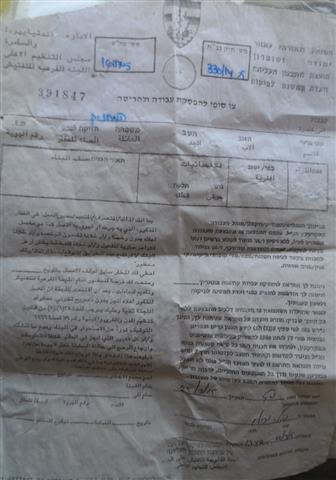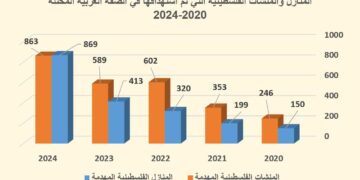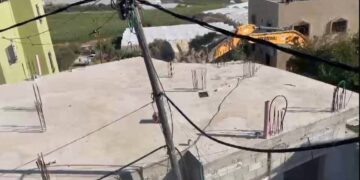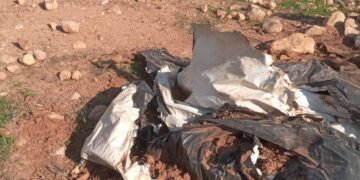Violation: demolishing agricultural room and water pool
Location: Halhul- Hebron
Date: 04/08/2015
Perpetrators: the Israeli occupation army
Victims: Citizen Waleed Qashqish
Details:
The Israeli occupation authorities on August 04, 2015 demolished an agricultural room and dumped a water pool with dirt. The attacked structures belong to Citizen Waleed Qashqish from the area of Al-Dahdah, south Halhul town in Hebron.
Qashqish told a researcher from Land Research Center that a force from the Israeli occupation army and Civil Administration accompanied by a JCB dozer raided his plot (1.5 dunums) at 7:00 a.m. in the morning and demolished an agricultural room founded in the land and dumped a water pool with dirt. Noteworthy, the interior of the room including agricultural equipments and other tools were destroyed under the rubbles.
Photos 1-2: signs of the structures’ demolition
Qashqish also said that the 16m2 room and the 9m2 water pool were built in 2014; the total estimate of the structures’ cost was 25,000 INS ($6631). It should be marked that the pool was used to harvest rainwater to be used for irrigation ends.
The citizen asserted that he found a stop-work order left by his land that was issued on November 23, 2014; the order came under the claim of “unlicensed construction”. December 15, 2015 was set as the hearing session for the Planning and Construction Committee in the Israeli court of Beit El to consider whether or not to demolish the notified structures.
Photo 3: the stop-work order on Qashqish’s structures
Qashqish reported that he did not know how to deal with the order, pointing out that he received a second one on March 25, 2015. The latest included a halt on construction works and the demolition of what has been founded in a 7 day deadline.
After the latest demolition, a researcher from Land Research Center visited the affected and guided him to the proper mechanism of legal response to the Israeli orders.
Land Research Center LRC sees that demolitions contradict with all of the International conventions and Humanitarian laws including:
- Article 17 of the (1948) Universal Declaration of Human Rights stating: “Everyone has the right to own property alone as well as in association with others. No one shall be arbitrarily deprived of his property.”
- Section ‹G› of article 23 of the (1907) The Hague Conventions asserting: “In addition to the prohibitions provided by special Conventions, it is especially forbidden to destroy or seize the enemy's property, unless such destruction or seizure be imperatively demanded by the necessities of war.”
- Article 53 of the Geneva Fourth Convention (1948) declaring: “Any destruction by the Occupying Power of real or personal property belonging individually or collectively to private persons, or to the State, or to other public authorities, or to social or cooperative organizations, is prohibited, except where such destruction is rendered absolutely necessary by military operations.”
- Section 1, Article 11 of the International Covenant on Economic, Social and Cultural Rights (1966): “The States Parties to the present Covenant recognize the right of everyone to an adequate standard of living for himself and his family, including adequate food, clothing and housing, and to the continuous improvement of living conditions. The States Parties will take appropriate steps to ensure the realization of this right, recognizing to this effect the essential importance of international co-operation based on free consent."
Prepared by
The Land Research Center
LRC

















